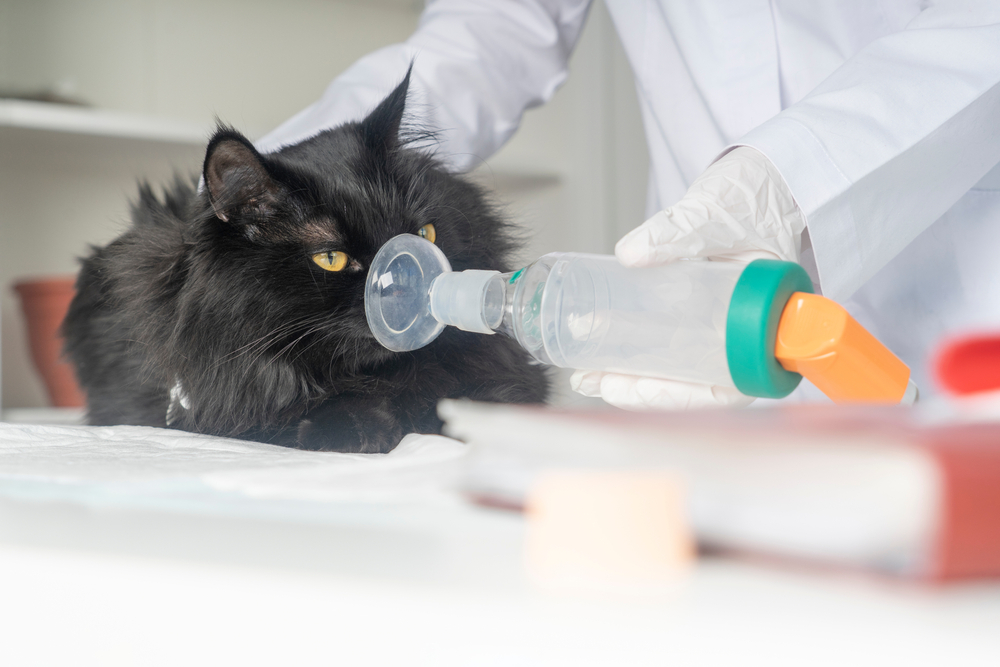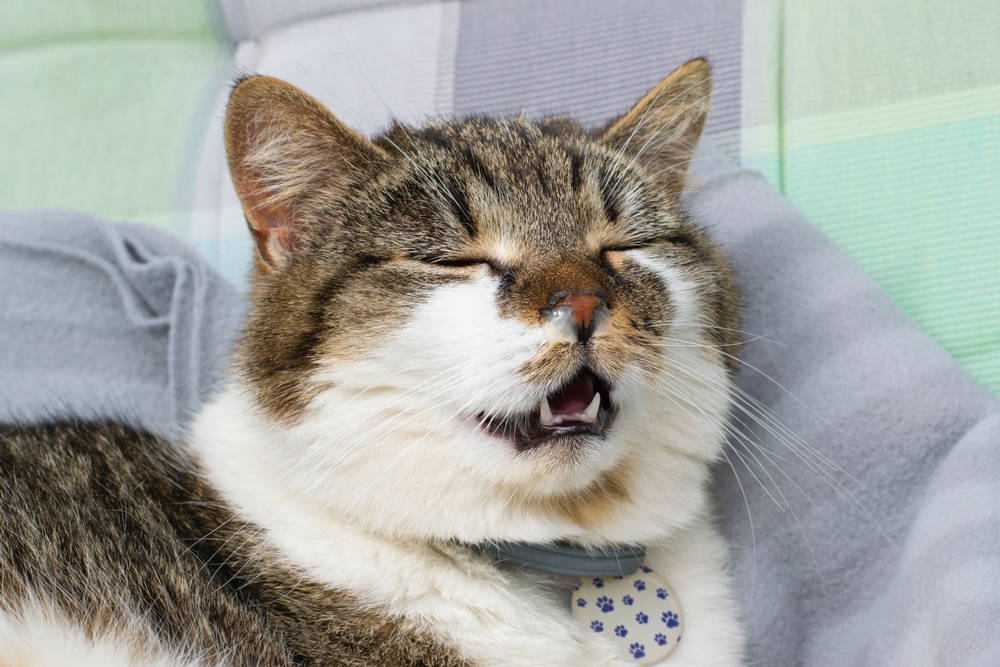Cat Asthma Attacks: Symptoms That Need Urgent Veterinary Care
Cats are known for their quiet grace and ability to hide discomfort. This natural tendency can make it difficult for owners to recognize when something is wrong- especially when it comes to breathing issues. One condition that often goes unnoticed until it becomes serious is feline asthma.
Asthma in cats is a chronic inflammatory disease of the lower airways that can cause coughing, wheezing, and even life-threatening breathing difficulties. If you’ve ever noticed your cat crouching with their neck extended, breathing rapidly, or producing a dry cough that sounds like gagging, asthma may be the cause. Understanding the signs and treatment options can make the difference between occasional flare-ups and a crisis.
At Peak Pet Urgent Care in Reno, we frequently see cats struggling with breathing difficulties that require immediate attention. Our goal is to help pet owners recognize asthma symptoms early, understand treatment, and know when urgent care is needed.
What Is Feline Asthma?
Feline asthma is a condition in which the immune system reacts to inhaled allergens or irritants by creating inflammation in the airways. This inflammation narrows the bronchial tubes, increases mucus production, and restricts airflow to the lungs.
Between 1% and 5% of cats are believed to suffer from asthma, with symptoms typically appearing between ages two and eight. Siamese and Himalayan breeds may be predisposed, though any cat can develop the condition.
Recognizing Symptoms of Feline Asthma
Asthma can mimic other respiratory conditions, which makes veterinary diagnosis essential. Some of the most common signs include:
- A persistent dry cough that can be mistaken for hairballs
- Wheezing or whistling sounds when breathing
- Open-mouth breathing after exertion
- Episodes of rapid or labored breathing
- The classic posture of crouching low with the neck extended and elbows spread, a sign your cat is struggling to move air
- Lethargy or reluctance to exercise
- Sudden collapse or blue-tinged gums in severe cases
Because these symptoms overlap with other conditions such as feline upper respiratory infections or even heart disease, only a veterinarian can determine whether your cat’s issue is asthma, infection, cardiac in nature, or something else entirely. Prompt evaluation is the safest way to protect your cat’s health.
Triggers and Risk Factors
Asthma flare-ups are often triggered by environmental factors. Common culprits include:
- Dust from litter boxes or household cleaning products
- Cigarette smoke or fireplace smoke
- Airborne allergens like pollen and mold
- Perfumes, aerosols, or strong cleaning solutions
- Stress or vigorous exercise
Cats in areas with poor air quality or high levels of seasonal allergens may be at higher risk. Since Reno’s climate can be dry and dusty, local cats may be more susceptible to airway irritation.
How Veterinarians Diagnose Feline Asthma
Diagnosis involves ruling out other causes of coughing and respiratory distress. At Peak Pet Urgent Care, our veterinarians perform a thorough exam and may recommend:
- Chest X-rays to evaluate airway and lung patterns
- Blood work to check for infection or other systemic disease
- Heartworm or parasite testing, since respiratory parasites can mimic asthma
- Response trials with medications to see if symptoms improve
Because asthma shares symptoms with other serious conditions, prompt evaluation is essential. Our urgent care services include diagnostics like X-rays and in-house laboratory testing, which allow us to assess your cat’s breathing problems quickly.
Treatment Options for Feline Asthma
Asthma cannot be cured, but it can be managed effectively. The primary goals are to reduce airway inflammation, control flare-ups, and minimize triggers.
Medication
The cornerstone of treatment is corticosteroids to reduce airway inflammation, often paired with bronchodilators to relax the airway muscles. Traditionally, these medications are given orally or by injection.
However, inhaled therapy using devices such as the AeroKat chamber has become increasingly common. This allows the medication to reach the lungs directly, reducing side effects and improving effectiveness.
Environmental management
Reducing triggers at home can greatly reduce flare-ups. Steps include using dust-free litter, minimizing aerosols and strong fragrances, vacuuming frequently, and using air purifiers.
Long-term care
Cats with asthma often require lifelong management. Regular check-ups with your family veterinarian or urgent care visits during flare-ups ensure that the treatment plan remains effective. With the right plan, many cats live full, active lives despite their diagnosis.
When Feline Asthma Becomes an Emergency
Asthma attacks can escalate quickly. Signs of respiratory distress require immediate veterinary attention. The American Animal Hospital Association outlines key warning signs of respiratory crisis, including open-mouth breathing, abdominal effort with each breath, and collapse.
At Peak Pet Urgent Care, we evaluate urgent cases on a triage basis, meaning the sickest patients are seen first. Our team can provide oxygen therapy, injectable medications, and diagnostic testing on-site. If your cat requires hospitalization, we coordinate seamlessly with trusted local partners. You can learn more about what to expect here.
The Role of Urgent Care in Managing Feline Asthma
Asthma management is often a collaboration between your family veterinarian and urgent care. Regular check-ups, diagnostics, and long-term medication are usually handled by your primary clinic. However, urgent care plays a vital role when:
- Your cat has an acute asthma attack outside of regular veterinary hours
- Medications are not controlling symptoms and immediate reassessment is needed
- Your family veterinarian refers you for diagnostic imaging or advanced care
Urgent care is also the right place to turn when you’re simply not sure. Is your cat’s coughing just a mild flare, or the beginning of a true emergency? Should you wait until morning, or act now? In those moments of uncertainty, it’s always better to have your cat evaluated promptly than to risk waiting.
Our facility bridges the gap between routine veterinary care and emergency services, giving you peace of mind when symptoms feel too serious to ignore but not clearly life-threatening. Explore our urgent care hours and availability so you know where to turn if your cat ever needs help breathing easier.

Urgent Care for Cats with Asthma in Reno, Nevada
Feline asthma requires a lifelong partnership between pet owners and veterinarians. By recognizing symptoms early, reducing environmental triggers, and having a clear plan for urgent care, you can keep your cat breathing comfortably.
At Peak Pet Urgent Care, we provide same-day diagnostics, treatment plans, and support for asthma flare-ups. If hospitalization is necessary, we coordinate care with trusted partners while ensuring your family veterinarian receives a complete record of the visit.
If you’re concerned about your cat’s breathing, don’t wait. Contact us online or call (775) 484-8400 today. Our Reno clinic is open seven days a week and ready to provide the urgent care your pet needs. Because if it feels urgent to you, it’s urgent to us.







Leave A Comment